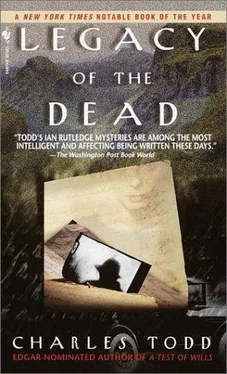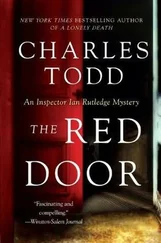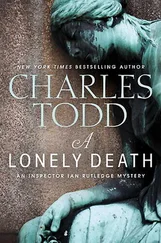Charles Todd - Legacy of the Dead
Здесь есть возможность читать онлайн «Charles Todd - Legacy of the Dead» весь текст электронной книги совершенно бесплатно (целиком полную версию без сокращений). В некоторых случаях можно слушать аудио, скачать через торрент в формате fb2 и присутствует краткое содержание. Жанр: Полицейский детектив, на английском языке. Описание произведения, (предисловие) а так же отзывы посетителей доступны на портале библиотеки ЛибКат.
- Название:Legacy of the Dead
- Автор:
- Жанр:
- Год:неизвестен
- ISBN:нет данных
- Рейтинг книги:5 / 5. Голосов: 1
-
Избранное:Добавить в избранное
- Отзывы:
-
Ваша оценка:
- 100
- 1
- 2
- 3
- 4
- 5
Legacy of the Dead: краткое содержание, описание и аннотация
Предлагаем к чтению аннотацию, описание, краткое содержание или предисловие (зависит от того, что написал сам автор книги «Legacy of the Dead»). Если вы не нашли необходимую информацию о книге — напишите в комментариях, мы постараемся отыскать её.
Legacy of the Dead — читать онлайн бесплатно полную книгу (весь текст) целиком
Ниже представлен текст книги, разбитый по страницам. Система сохранения места последней прочитанной страницы, позволяет с удобством читать онлайн бесплатно книгу «Legacy of the Dead», без необходимости каждый раз заново искать на чём Вы остановились. Поставьте закладку, и сможете в любой момент перейти на страницу, на которой закончили чтение.
Интервал:
Закладка:
Trevor smiled. “Once a policeman, always a policeman.”
Rutledge grinned in return. “Blame human nature. Curiosity is man’s besetting sin.”
“The Garden of Eden,” Trevor agreed. “Eve is always blamed for offering Adam the apple, but it’s my view that he had been looking for an excuse to see how it tasted. He would have bitten into it on his own in a day or two.
“What I find interesting about the situation you described,” Trevor went on, “is that I know the Chief Constable in that district. Robson. A good man. So is the fiscal, by reputation. I can’t quite see Robson railroading a young woman if there was no real evidence against her. You know that Scotland is different from England in that we don’t have a coroner’s inquest. The procurator-fiscal and the Chief Constable, together with the officers involved, discuss the evidence and come to a decision as to whether or not there should be a trial. It isn’t based on a coroner’s jury that might be prejudiced for or against the suspect. And it’s often decided on several levels-whether, for instance, the woman would be better off having a jury establish her innocence for all to see. Have you considered that aspect of a trial, Ian?”
Rutledge finished his soup and set down his spoon. “I have, but it seems to me that bringing her to trial-assuming of course that she’s innocent of the charges-has hardened feelings against her. In the upshot, the jury might prefer to hang her.”
Trevor nodded to Morag to take away his empty soup plate and said, “They’ll work it out, Ian, but I’d watch my back if I were you. I’ve never met this Inspector Oliver, but he’s certain to resent your interference-that is, if he’s still smarting from his encounter with Lady Maude. And she could be trouble, come to that. There’s a very complex relationship between parent and child, and I have a feeling you’ll be damned if you do-and damned if you don’t- prove conclusively that Eleanor Gray has nothing whatsoever to do with this business.”
“If women sat on the jury, there would be no doubt that this young woman would be convicted-and the question is, will they bring such pressure to bear on their menfolk that the results are the same?” In his own cases, Rutledge made it a point to be absolutely certain that his evidence, clearly presented, left no room for doubt. In his mind or the jury’s. But jurors were often contrary-convicting where there was only circumstantial evidence and acquitting where proof seemed indisputable.
“Burns-the fiscal-is too good a man to allow a prejudiced jury.”
But was he? The woman was already set for trial on purely circumstantial evidence. What if, Rutledge thought, he himself proved that the bones on the mountainside were Eleanor Gray’s and that she had borne a child before she died? The assumption would be that it was the child the accused was raising. A natural assumption-but not necessarily a true one. Would there be justice-or a miscarriage of justice? And for the child’s sake, it was imperative that Rutledge got it right. He could feel tiredness seeping into his shoulders and into the muscles of his neck.
“Are ye up to it, then?” Hamish asked.
Rutledge let the subject drop. At the end of the meal, David Trevor studied him for a moment, then said, “It’s still on your mind, isn’t it? That problem in Duncarrick. You’ll be leaving for good in the morning, I take it.” There was a note of regret, barely concealed, in the pleasant voice. “I’m glad you came. You don’t know how much it has meant to me to have you here.”
Rutledge looked down at his plate. “I wasn’t sure I could face coming back to Scotland. It seemed insurmountable, just thinking about it.”
Trevor said, “Yes, it’s different, isn’t it?” With a sigh, he added, “I suppose a time will come when I don’t listen for him in the late afternoon, just before tea. Or lie awake at night, thinking I’ve heard his key in the lock. Or look for him at breakfast in the morning.”
But Rutledge hadn’t been thinking of Ross Trevor. His mind had turned to the dead Scots soldiers who had not come back at all.
On the brink of sleep that night, the nagging doubts began.
Hamish, listening to the questions that Rutledge was mentally cataloging, said, “You canna’ know the whole of it. You havena’ interviewed the prisoner nor looked at where they found the victim. You havena’ spoken to the neighbors nor even seen the child. You’ve heard only yon constable’s view of the matter, and he’s prejudiced in the woman’s favor.”
Rutledge said in defense of his doubts, “I’ve investigated too many murders, I know something about the way evidence comes to light. The facts here don’t fit awkwardly, as they should do. Who could have known that the skeleton was in the back of the cabinet in that stable? Someone did, I’ll wager! Because Oliver came back a second time to search. If he didn’t know, who did?”
He turned over, feeling sleep slipping away from him.
“The inn is closed, the child is taken away, and the woman is sent to prison to stand for her trial,” he went on to himself, unable to stop his mind from working. “With no impediment.”
Hamish countered, “Aye, but there was no way of knowing the Yard would be brought into the case.”
“Why did Lady Maude change her mind? I was nearly certain when I left there that her daughter was alive and well. Why did she change her mind? ”
Hamish said, “She didna’ strike me as frivolous or foolish.”
And that, Rutledge thought, finally on the verge of sleep, was an extremely insightful analysis of Lady Maude.
The next morning in the rain Trevor helped Rutledge carry his luggage out to the car, then shook his hand warmly. Morag, a shawl over her head, came to embrace him, shamelessly reaching up to him. Rutledge found himself wishing that he needn’t leave after all. He had found ghosts here-and affection. The ghosts he was accustomed to. Affection he was not.
The rain fell in a heavy downpour that seemed to presage winter, a coldness in the air that touched the skin as he drove back to Duncarrick.
Inspector Oliver wasn’t at the police station. The constable on duty, MacNab by name, stood up warily as Rutledge introduced himself, and offered to send for Oliver. “For he’s out at a farm west of town. There’s been a rash of small fires that were probably set on purpose.”
“No, let him finish his business. I’ll be at the hotel-The Ballantyne. Tell him he can find me there.” He left, wondering to himself if Constable McKinstry could put a name to the arsonist.
The hotel offered an old-fashioned but comfortable elegance that breathed Victorian respectability. The young woman behind the desk looked up as he came dripping in and smiled. “Good morning, sir! In a manner of speaking!”
He took off his hat and looked ruefully at the wet brim. “Indeed. I think I could use a drink. Then I’d like a room.”
“I’ll be glad to see to that for you, sir.” She indicated the door to his left. “The bar parlor is through there.”
“Thanks.”
He went through the door and found the room filled with other refugees from the rain. The atmosphere was muggy, as if the dampness each had brought with him had settled in a cloud around them, like fog. The smell of wet wool mingled with wood smoke. Someone had lit the fire on one side of the paneled room, and it struggled to assert itself, adding measurably to the gloom. But no one paid any heed, lively conversations holding their attention instead.
Rutledge found a table by the windows that overlooked the street. He could hear the laughter from the bar, rough and male, workmen who had taken advantage of the rain to stop in for a pint.
He wondered how many of them had once patronized The Reivers.
Читать дальшеИнтервал:
Закладка:
Похожие книги на «Legacy of the Dead»
Представляем Вашему вниманию похожие книги на «Legacy of the Dead» списком для выбора. Мы отобрали схожую по названию и смыслу литературу в надежде предоставить читателям больше вариантов отыскать новые, интересные, ещё непрочитанные произведения.
Обсуждение, отзывы о книге «Legacy of the Dead» и просто собственные мнения читателей. Оставьте ваши комментарии, напишите, что Вы думаете о произведении, его смысле или главных героях. Укажите что конкретно понравилось, а что нет, и почему Вы так считаете.












